Due to globalization and digitalization, the world of work is undergoing comprehensive change.
These trends are challenging management accounting (MA) and pressuring individuals and organizations to
change. The literature postulates a replacement of traditional organizational careers by “new” career models
characterized by dynamism and flexibility. However, the state of the art on careers in MA lacks empirical
evidence and has disparate research interests.
In this study, the authors investigate the status quo of careers in MA, key
influencing factors and assumed change in such careers. To do so, the authors conducted a quantitative
empirical study, based primarily on the careers of 83 graduates of a department offering a MA major at a
German-speaking university. Nine qualitative empirical interviews supplement the quantitative findings.
The authors’ findings indicate that whileMAcareers are changing, the characteristics of the profession
are continuing to concur with the traditional organizational understanding of careers. Accumulated professional
experience is the key factor to achieving a management position although management accountants tend to become
more dynamic in terms of career paths and career understanding. Thus, employment in various functional areas
opens new career paths in MA.
The methodology of analysing quantitative and empirical crosssectional
data and the resulting final sample size is too small to guarantee robust statistical inference.
Moreover, further interviews would lead to greater data saturation.
The study sheds light on the under-researched question of how careers in MA
proceed and develop. This could be of interest for practitioners working with management accountants such as
personnel consultants.
This study contributes to the field through its comprehensive consideration of careers in
MA in this changed context, thus providing new insights for academia and business practice.
![[Translate to Englisch:] JAAR](/fileadmin/_processed_/1/e/csm_JAAR_1f5a8414a2.png)
The paper "Bankruptcy at family and non-family firms: Do they fail differently" by Christine Mitter, Michaela Walcher, Stefan Mayr and Christine Duller was published in the Journal of Family Business Management (VHB JQ 3: C) at the end of 2022. The publication resulted from the insolvency study carried out at the Institute for Management Control and Consulting in cooperation with the Salzburg University of Applied Sciences, in which all insolvencies in the province of Upper Austria from 2012 were analyzed.
In view of the fact that for family businesses the preservation of the company over generations has the highest priority, that family businesses have close relationships with employees, customers, suppliers and other stakeholders, and that they attach great importance to their image and reputation, insolvency is a drastic event and a major threat. The article examines whether family businesses fail for different reasons than non-family businesses.
The results of the study confirm that the special features of family businesses have an impact on the causes of insolvency. The family businesses examined fail less frequently than non-family businesses due to internal causes of crises (such as unqualified management, strategic mistakes or a lack of business skills). This could be attributed to the strong identification of the owners with the company, the many years of experience of the entrepreneurial family and family control, which enables both the development of implicit knowledge and rapid and drastic reactions in the event of a crisis.
At the same time, insolvencies in the family businesses analyzed are caused more frequently than in non-family businesses by external factors, in particular bad debts or the loss of key customers and economic downturns. This indicates that the close relationships between family businesses and their stakeholders can become a burden in the crisis. Family businesses should therefore pay more attention to stakeholder dependencies and the resulting risks.

International and national reforms in the field of higher education cause a change in the management process of public universities in Austria. Austrian public universities have to report their Intellectual Capital in terms of a “Wissensbilanz” to the ministry. The Austrian “Wissensbilanz” has several management functions such as reporting, coordinating, planning, decision-making and benchmarking. The use of these functions as a management tool for human resource management has not been dealt with yet. Therefore, this paper analysis the usage of the “Wissensbilanz”-functions for internal management in the field of human resource management.
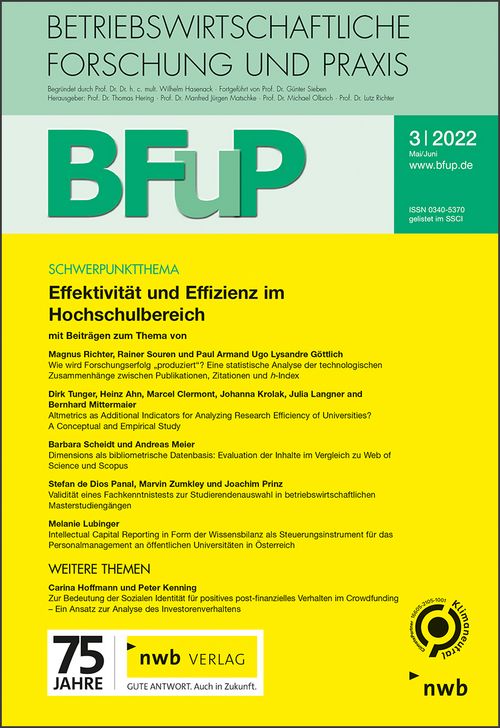
Workplace chaplaincy, a concrete manifestation of workplace spirituality, is defined as pastoral care serving the specific needs of people in workplaces. While scientific publications have so far emphasized its beneficial implications, scrutiny of the possible instrumentalization of workplace chaplaincy by the management has been neglected. Workplace chaplaincy can signify a real integration of spirituality implying a debate on the meaning of life and work, as well as a critical analysis of organizational structures and management (critical workplace spirituality). Just as well, it can be instrumentalized as a management technique to impel employees to achieve improved organizational results (positive workplace spirituality).
This paper contributes to the management literature by elaborating decisive characteristics of a critical and positive workplace spirituality and discussing those characteristics that pertain to workplace chaplaincy. Furthermore, we provide a qualitative study on workplace chaplaincy illustrating a critical thought-provoking model facing different challenges, allegiances and logics in the secular working world. The elaborated characteristics and the qualitative study extend our understanding of workplace spirituality and chaplaincy as they provide a view beyond traditional management perspectives. Moreover, this paper contributes to the discussion what kind of spirituality and chaplaincy we are referring to in management theory and practice.
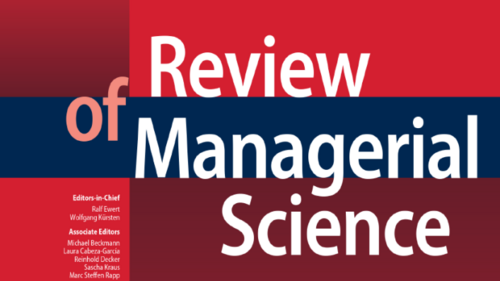
The article examines the effects of various accounting parameters (e.g. quality of the accounting systems or early warning systems, existing planning systems) on the short- and long-term restructuring success of SMEs. The study is based on a complete survey of all SME insolvency cases with more than ten employees (n = 117) in Upper Austria in 2012 and contains data on short-term survival (in 2016) and long-term survival (in 2019). The results of the study show that the quality of the accounting systems, the quality of the early warning systems and the existence of a restructuring concept have a positive influence on the success of the restructuring of SMEs. Refurbishment concepts in particular significantly increase short- and long-term refurbishment success by ensuring efficient and effective use of resources.
 ©JAOC
©JAOC
Family businesses (FB) have an ambivalent character when it comes to crises. On the one hand, problems in the family environment and a lack of innovative ability are considered to be the causes of the crisis, on the other hand, flexible decision-making processes and family commitment are said to have positive effects on the course of the crisis. This article empirically analyzes the causes of crises, remedial measures and crisis management at FB on the basis of a system-theoretical and procedural approach. The results of the qualitative-empirical multiple case study of 14 Austrian FB show family-specific challenges. The personal and financial commitment of the family as well as the willingness to change, which leads to a professionalization of the management, are decisive for the continued existence. From an economic point of view, the reorganization in a new shareholder structure can be useful, although the identity as a FB is lost.
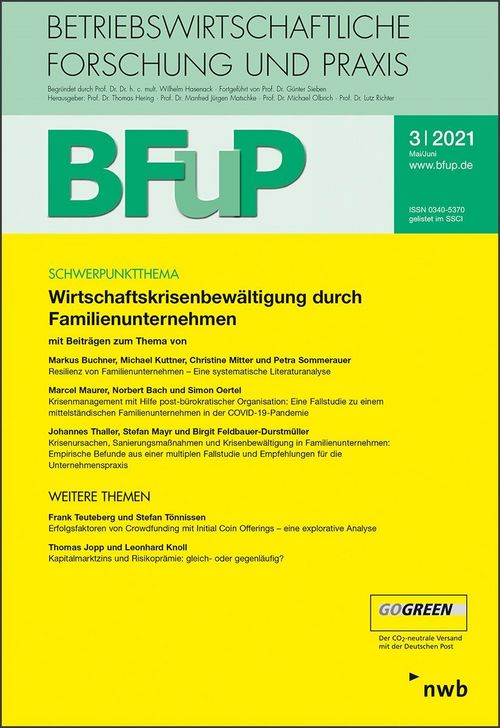
While the necessity of financial management in Christian organizations has been confirmed in studies, the organizational and personnel implementation leads to challenges for the handling of which there are no studies in the existing literature. The aim of the article was therefore to examine, using the example of German-speaking Benedictine male monasteries, how and with what challenges the management positions in financial management are filled, how they are currently being dealt with and which additional recommendations can be derived for coping. It turned out that the challenges differ significantly, depending on whether it is a secular or spiritual financial manager.
 ©BFUP
©BFUP
Systematic review techniques are about to become the “new normal” in reviews of management research. However, there is not yet much advice on how to organize the sample selection process as part of such reviews. This article addresses this void and analyzes this vital part of systematic reviews in more detail. In particular, it offers a critical review of systematic literature reviews published in the Academy of Management Annals and the International Journal of Management Reviews between 2004 and 2018. Based on this methodological literature review, the article presents issues to consider in the most critical choices during the sample selection process. Furthermore, this review identifies several descriptive features such as the mean number of research items included in systematic reviews, the mean number of databases used, and the mean coverage period of such reviews. These numbers may be used as benchmark figures in future reviews.
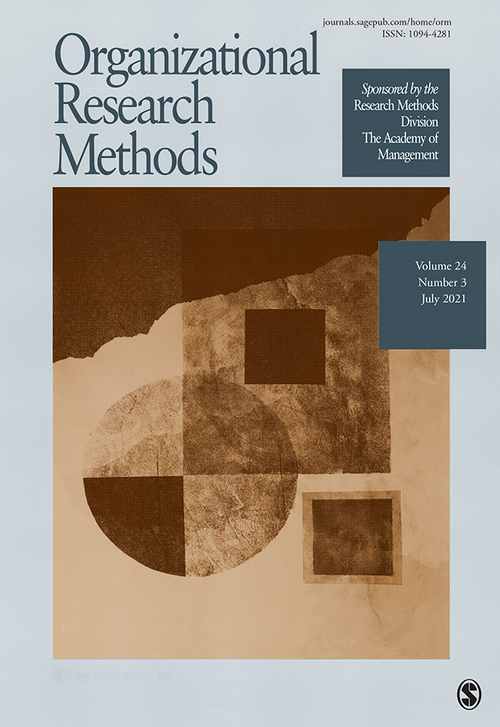 ©Organizational Research Methods
©Organizational Research Methods
The economic effects of the COVID-19 crisis are currently being discussed in a very complex way. This article reflects the results of a discussion with the representatives of the creditor protection associations and presents the current discussion on planned changes in insolvency law.
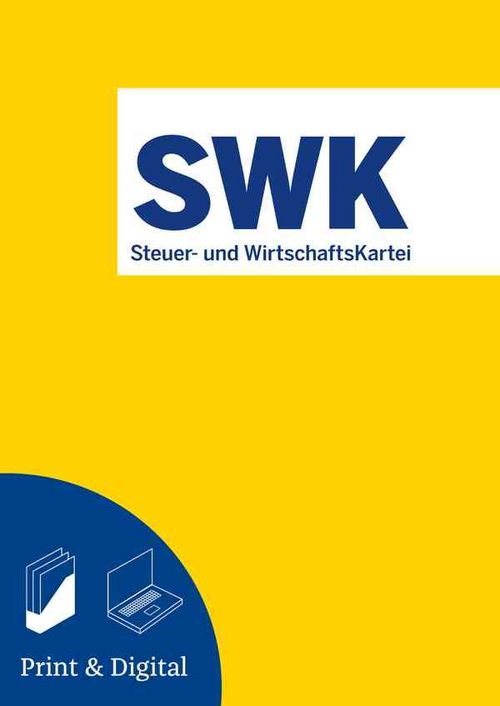 ©SWK
©SWK
Purpose
This paper provides a comprehensive view about corporate social responsibility (CSR) in Austrianfamily firms. In detail, the conceptual understanding, motives for, institutionalisation, planning and theoutcomes of CSR are investigated. The authors refer to socioemotional wealth and stewardship aspects asexplanation approaches for CSR in family firms.Design/methodology/approach–This study offers new insights into CSR in Austrian family firms basedon qualitative data from 30 companies.
Findings
The findings demonstrate that despite numerous social, environmental and economic activities,referral to CSR is just in the beginning, indicating a lack of dissemination of the concept of CSR. The mainmotives for CSR engagement are image and reputation concerns, a strengthened regional embeddedness andemployee-related improvements. Social CSR activities concerning employees and the close companysurroundings dominate, whilst environmental CSR measures are often determined by the need for fulfillingthe requirements of eco-certifications.
Originality/value
This paper contributes to the existing CSR literature by offering deeper insights into CSRin Austrian family firms (e.g. motives and outcomes of CSR), which are discussed under socioemotional wealthand stewardship aspects. Moreover, a broad range of implications for future research and corporate practice(e.g. family firms, owning family, policy) are discussed.
 ©Journal of Family Business Management
©Journal of Family Business Management
The main purpose of this article is to study the role of house banks in out-of-court reorganization. Banks are traditionally one of the most important financial resources for firms. Especially in financially difficult times like those we now face due to the coronavirus, it can make a difference whether a bank supports its clients and accompanies firms through a crisis or not. With the help of relationship lending theory, we review the existing literature on this topic. Next, based on empirical findings from Austrian banks, we derive implications for corporate practice. The empirical study covers a sample of 658 firm reorganizations in Austria. The data were collected anonymously by different banks processing the cases in their workout departments between January 2011 and December 2013. Correlation analysis and logistic regression were applied to analyze the data. The findings indicate that house banks, despite their relationship of trust, must be critical in their assessment of reorganization projects due to the danger of zombie lending. The four most important prerequisites for completing an out-of-court reorganization were a new loan, an open and proactive communication policy on the part of the distressed company, management changes, and a financial contribution from existing shareholders. The findings show that bank-supported out-of-court reorganization has a high probability of success. A recommendation to entrepreneurs is to respond rapidly to financial distress and maintain open communication with stakeholders, in particular banks. The findings indicate that the implementation of Directive (EU) 2019/1023 on preventive restructuring frameworks in the European Union is crucial to enable bank-led reorganizations.
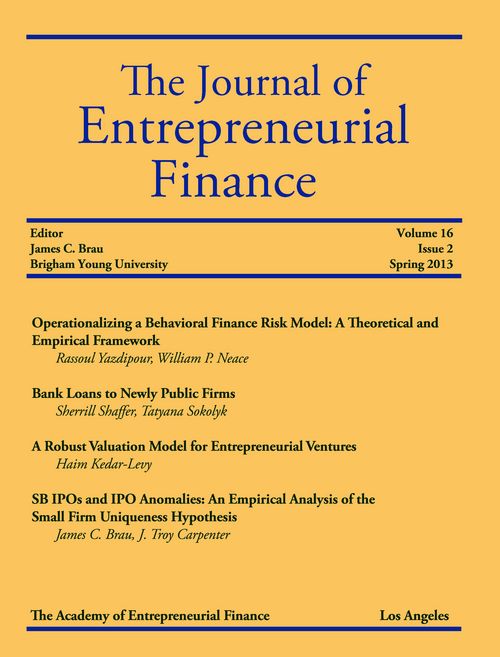 ©The Journal of Entrepreneurial Finance
©The Journal of Entrepreneurial Finance
Small and medium-sized enterprises (SMEs) are especially dependent on the qualifications and knowledge of entrepreneurs. However, research investigating how the causes of small firm failures are related to entrepreneur characteristics is scarce or even lacking. Therefore, drawing on upper echelons theory, this study is based on a sample of 102 Austrian corporate bankruptcies in the year 2012 and applies logistic regression analyses to examine the relation between entrepreneur characteristics, namely, age, gender, education and experience, and the probability of specific internal causes of bankruptcy. Our findings reveal that firms that are led by older entrepreneurs are significantly less likely to go bankrupt due to a lack of equity, while females reduce the probability of failure because of poor economic competencies. On the other hand, women-headed firms are more prone to bankruptcy due to high costs pressures and firms led by entrepreneurs with industry experience seem to underestimate capital needs and are more likely to fail because of a lack of equity. In particular, management experience appears to be important as it significantly reduces the risk of bankruptcy due to poor business economic
competences and high cost pressure. Given that we were unable to detect a significant impact of an entrepreneur’s university degree
on the analyzed failure causes, our results may also allow for the improvement of entrepreneurship education. Knowing which entrepreneurial characteristics influence business demise allows to draw more attention on the impact of these traits and the development
of management experience in entrepreneurship programs.
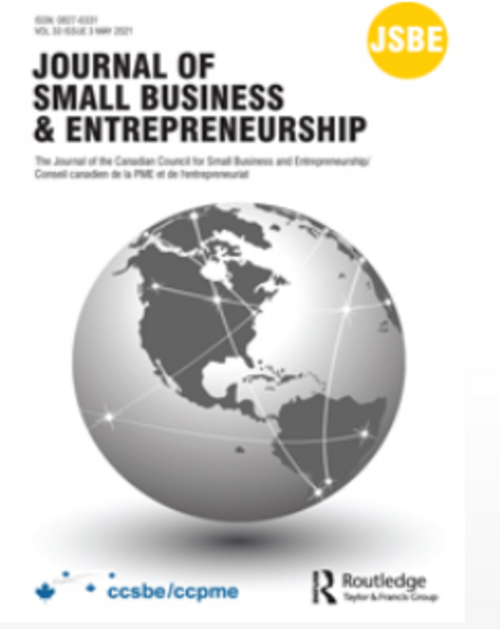 ©Journal of Small Business & Entrepreneurship
©Journal of Small Business & Entrepreneurship